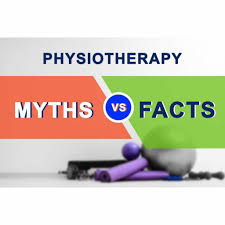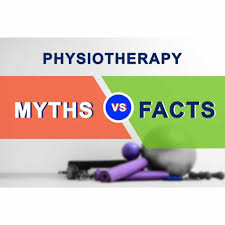Physiotherapy or Physical Therapy, is a field which is very well known to many people, known to some and yet a mystery and unknown to most. As a physiotherapist myself, I come across several misconceptions that people have in their minds about physiotherapy and certain myths which are totally untrue.

In this post, I list some myths and misconceptions surrounding physiotherapy-
Myth 1- A person needs a referral to see a physiotherapist.
Yes, there are physicians and surgeons who refer a patient for physiotherapy, but that doesn’t not mean you always need their referral to get yourself checked by a physiotherapist. A person can visit a physiotherapist directly and get checked by him/her. In case the physiotherapist feels that the condition cannot be cured by physiotherapy, he will redirect the person to the appropriate specialist.
Myth 2- Physiotherapy is just applying electrical machines and modalities.
Physiotherapy is a rehabilitative science and branch of medicine which focuses primarily on exercise to help a patient get better. Electrical modalities or machines are add-ons which provide temporary relief from pain but to get long term results, proper rehabilitative program is essential. Unfortunately, there are many physiotherapists who just strap a patient to a machine and don’t provide any other input, hence, this misconception that physiotherapy means machine application has spread quite a bit.
Myth 3- Physiotherapists only treat muscle, ligament or tendon related problem or sports injuries.
Although a large portion of physiotherapy includes muscle, ligament and tendon related injury treatment and sports related injuries, a variety of other conditions is also treated by physiotherapy.
Not only are physiotherapists specialized in diagnosing and treating all musculoskeletal pathologies in any area of the body, some also follow advanced courses in vestibular rehabilitation, mental imagery for chronic pain, pelvic floor rehab for urinary incontinence, etc.
Even in cardiac conditions, neurological conditions, old age problems, child physiotherapy and pre and post pregnancy, physiotherapy plays a vital role.
Myth 4- Physiotherapy is a temporary fix and if you don’t see immediate results, physiotherapy does not work.
Physiotherapy is a lasting therapy and the aim is to not just cure a condition but also to prevent a patient from falling prone to an injury again.
A good, authentic and well learned physiotherapist will always know that physiotherapy gives long term benefit and not just a temporary fix.
You do see immediate results in certain conditions, but in long standing cases like a stroke patient, physiotherapy may take time, but that does not mean it is not working. Just that the progression towards a result may take some time, patience and persistence and follow up from the patient’s side.
Myth 5- Surgery is the only option available.
In many cases, physiotherapy has been shown to be as effective as
surgery in treating a wide range of conditions—from rotator cuff tears
and degenerative disk disease, to meniscal tears and some forms of knee
osteoarthritis.
In fact, physiotherapy is the best form of cure and in most cases is successful in preventing people from undergoing surgery, unless of course, the condition of the patient is beyond the scope of physiotherapy or cannot be cured by it.
Myth 6- Physiotherapy means massage.
This is the most hilarious and common one. Physiotherapists are NOT masseuses or spa people giving massage.
Techniques called as Mayofascial Release(MFR) or Deep Tissue Release (DTR) are done where in the physiotherapist will release an affected group of muscles or a particular muscle which can be at times really painful and not at all compared to a massage! The physiotherapist has studied and has the anatomical knowledge regarding the position and location of each muscle and treats it accordingly if and when required.
So there you are, here I have listed a few of the myths surrounding physiotherapy. Hope it helps in clearing the misconceptions regarding the profession.
Stay healthy, stay safe!
–Dr. Manasi Anand (PT)
Physiotherapist, Writer, Blogger.

